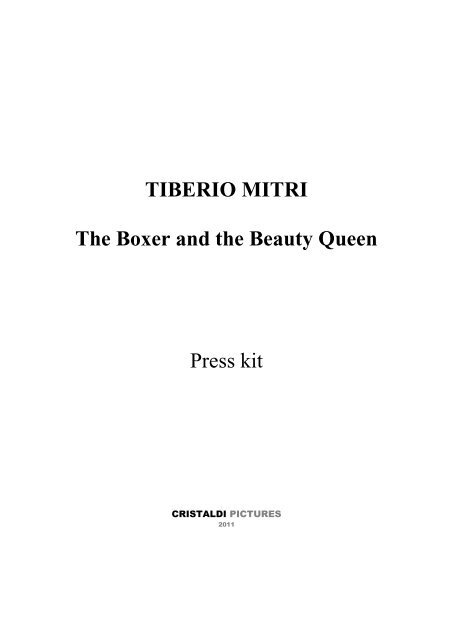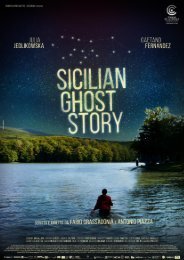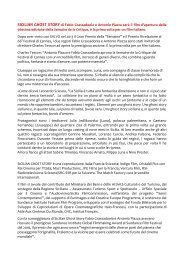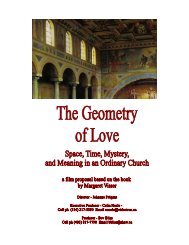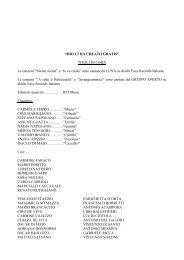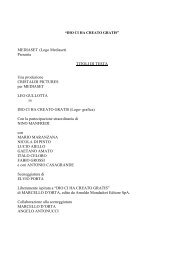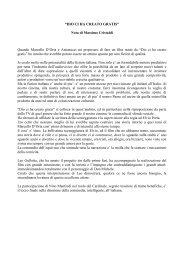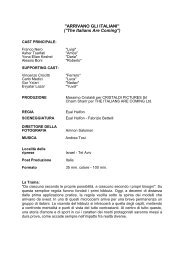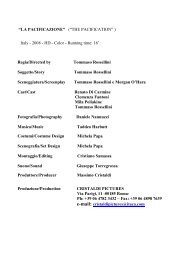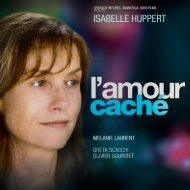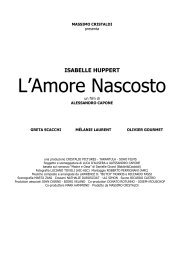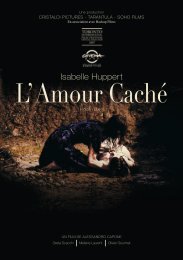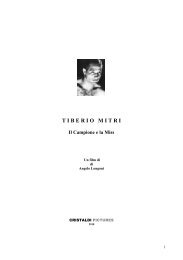You also want an ePaper? Increase the reach of your titles
YUMPU automatically turns print PDFs into web optimized ePapers that Google loves.
<strong>TIBERIO</strong> <strong>MITRI</strong><br />
The Boxer and the Beauty Queen<br />
<strong>Press</strong> <strong>kit</strong><br />
CRISTALDI PICTURES<br />
2011
<strong>TIBERIO</strong> <strong>MITRI</strong> - The Boxer and The Beauty Queen<br />
TV Miniseries (2x100’)<br />
Screenplay:<br />
Story:<br />
Directed by:<br />
Alessandro Sermoneta and Elena Bucaccio<br />
Maurizio Giammusso and Angelo Longoni<br />
based on the book “La botta in testa” by Tiberio Mitri<br />
Angelo Longoni<br />
Produced by: Massimo Cristaldi<br />
a CRISTALDI PICTURES / RAIFICTION Co-production<br />
Cast:<br />
Luca Argentero (Tiberio)<br />
Martina Stella (Fulvia)<br />
Production Designer: Giantito Burchiellaro<br />
Costume Designer:<br />
D.o.P:<br />
Lia Morandini<br />
Patrizio Patrizi<br />
Locations:<br />
Shooting format:<br />
Trieste, New York, Roma<br />
Super 16mm, finalized in HDCAM SR<br />
Production budget: € 4.728.490,00<br />
First broadcasting: September 26-27, 2011 (RAIUNO)<br />
CRISTALDI PICTURES<br />
2011
<strong>TIBERIO</strong> <strong>MITRI</strong> - The Boxer and the Beauty Queen<br />
Synopsis<br />
“The Boxer and the Beauty Queen” tells the story of the passionate and turbulent love story<br />
between Tiberio Mitri, European middleweight boxing champion in the 1950s and the ravishing<br />
Fulvia Franco, winner of the Miss Italy contest in 1948.<br />
Tiberio and Fulvia are two stars, so handsome and beautiful that everyone loves them. They meet,<br />
fall in love and marry.<br />
Both driven by great ambition yet jealous of each other’s successes, they end up not being able to<br />
cope with harsh reality and - after having won international titles, known fame, experienced the<br />
“American dream”, gone on tour with a successful theatrical review and had their only child - they<br />
break up.<br />
But their passionate union was so strong that they were to meet up again.<br />
Their romantic and irrational love story has stuck in the memory of all Italians. And no one can<br />
forget Tiberio’s legendary fight with the “Bronx Bull” Jake La Motta: 15 furious rounds from<br />
which Tiberio came out the loser, but with great honour, in a match that lives on in the annals of<br />
boxing.
Director’s notes<br />
Retracing Tiberio Mitri’s life story, as well as providing an opportunity to review<br />
the life of a great Italian sportsman, also means taking a new look at the history<br />
of Italy in the wake of 2 nd World War and through into the Fifties.<br />
A young and naïve Italian nation, full of hope and eager to get on in life,<br />
yearning for wealth and fortune as a way of nursing the wounds of the war, the<br />
all-pervasive poverty, the rubble left by the many bombings and fierce civil strife.<br />
A country full of enthusiasm that, along with it’s economic recovery, was also<br />
witnessing the birth of all the essential elements of its national and social<br />
character that were to remain well-rooted in the memory of every Italian.<br />
First came the radio, then television, cinema, the Miss Italia pageant, music,<br />
cars, the unattainable dream of America as a point of reference and a goal.<br />
These are just a few of the ingredients that went spiced the life of Tiberio Mitri,<br />
born in Trieste, married with the most famous woman in Trieste at the time:<br />
Fulvia Franco, Miss Italia.<br />
A beautiful and much envied young couple still covered in the dust of war and<br />
marked by the hunger suffered under the Fascist regime.<br />
The first gossip column couple, the earliest glitzy victims of what, in the years to<br />
come, was to mutate into a negative and second-rate form of gossip mongering<br />
and bad-mouthing of public figures devised to titillate the masses.<br />
By stealing the headlines, basking in their glorious love, so brimming with youth,<br />
vigour and sex appeal, they stood out as role models for everyone who at the<br />
time was trying to find the strength, the energy and the drive to put poverty<br />
behind them.<br />
If they could make it, with their totally anonymous backgrounds, being born of<br />
working class families, then everyone had a chance, there was a glimmer of<br />
hope for anyone who was set on asserting themselves even in such a backward<br />
and battle fraught nation.<br />
The life of this handsome, hope driven boxer, beloved by women and by his<br />
fans and in his passionate relationship with his beautiful wife, seems to be<br />
emblematically linked to the history of our country throughout the Fifties and in<br />
the two decades that followed.<br />
Mitri, like Italy, tried to shake off the shackles of poverty and ignorance by<br />
exploiting his own talents to the full through constant effort and application,<br />
believing that effort and application were sufficient to achieve success.<br />
Mitri, like Italy, came up against the harsh reality of the times and was forced to<br />
come to terms with his true potential and had to reassess his hopes and his<br />
dreams of greatness.<br />
Mitri, like Italy, had risen to great heights only to experience a tragic fall from<br />
grace, the illusion and the betrayal, the charm of a future full of hope and the<br />
disenchantment of the present.
But like Italy, the life of Tiberio Mitri, is also completely permeated with romantic,<br />
irrational, utterly sentimental and poetic joie de vivre, bold irony, playful<br />
individualism and that almost infantile brand of enthusiasm that is typical of the<br />
Italian esprit throughout the world that distinguishes Italians wherever they go.<br />
And the outcome of Tiberio’s greatest fight, the one against Jake La Motta,<br />
provides a clear demonstration of this spirit, the story of two Italians abroad, one<br />
with the dream of conquering America and the other, a son of immigrants, who<br />
had already succeeded in doing so.<br />
Summary<br />
Tiberio Primo Mitri was born in Trieste on the 12 th of July 1926 from a family of<br />
little means who had to make do with the paltry wage of the householder.<br />
His father, a violent, dim-witted man with a serious drinking problem, died when<br />
he was only 10, leaving his wife to bring up Tiberio and his younger brother,<br />
seeing as she was the only adult left in the family capable of looking after the<br />
two children.<br />
Fulvia Franco was also born in Trieste from a lower middle class family, her<br />
father was a meek and unassuming man who lived very much in the shadow of<br />
his wife, a strong-willed and ambitious woman who having got nothing out of life<br />
for herself could only project her own yearning for success onto her daughter.<br />
The girl was therefore brought up with a overbearing dictate: to succeed in life<br />
at whatever cost and without being too particular either.<br />
The lives of the two children ran parallel to each other, marred by the war, the<br />
Fascist regime and in Tiberio’s case, by extreme poverty, something that Fulvia<br />
did not have to bear to such an extent.<br />
As a kid, in order to make ends meet, Tiberio took to petty crime, he got by as<br />
best he could, often getting involved in street fights and his conduct was<br />
deemed so reprehensible that he and his brother ended up in the Trieste<br />
reformatory, which was part something halfway between a college and a<br />
borstal.
On her mother’s bidding Fulvia was in the meantime taking every opportunity to<br />
shine, to excel, she had to be the most beautiful, the most capable ever since<br />
primary school. Being top in everything had become a kind of obsession which<br />
was greatly to affect her in the future. The obsession to come out on top when it<br />
is not backed by actual ability tends to generate frustration and rage, and not<br />
being able to reach certain objectives due to a basic lack of the necessary skills<br />
often leads people to look for the short cut.<br />
Tiberio became a boxer without knowing it, he was so used to punch ups in the<br />
street and holding his own to protect himself and his brother from everyone that<br />
it came perfectly naturally.<br />
In Trieste, he started to train in a very tough boxing school, where the only<br />
actual rule was taking your punches and staying on your feet.<br />
Trained in the art of boxing by trainers constantly on the look out for new talent<br />
he began to box having a clue about boxing.<br />
His rage and his eagerness were so fierce that he feared no one who might<br />
stand before him.<br />
He fought to hurt, to hit, to win.<br />
He knew nothing of strategy, tactics or style, he was just quick, his nifty footwork<br />
and his constant movement tiring his opponents into submission.<br />
At the age of twenty he made his professional debut.<br />
Fulvia was a beautiful girl, and some, the right shape in all the right places, her<br />
face was enchanting, she was artful, determined but she didn’t have what it took<br />
to make her name where it meant most to her, Her dream, what she would give<br />
her life for, if she could, was show business, acting.<br />
And she wouldn’t make do with any old role, she had to be a diva, unique.<br />
There is no doubt she was not the only one to fuel her ambitions, her mother<br />
almost forced her want for herself what she had never achieved.<br />
The constant and pressing influence of her mother, gradually convinced her that<br />
this was what was right for her.<br />
So she tried every avenue open to her, even the Miss Italia beauty pageant.<br />
At twenty Tiberio makes his professional debut. His style is still poor, he has no<br />
knockout punch but he has plenty of stamina, he’s quick, he keeps going and<br />
never gives up. Tiberio can take punishment, he’s not scared of getting hit, or<br />
feeling pain.<br />
His boxing style tends to disconcert opponents, he is elusive, with quick<br />
footwork and never lets up.<br />
He wins the Italian title in ’48 and in Trieste he is almost a hero.<br />
Fulvia too becomes a heroine when she wins the crown of the Miss Italia<br />
pageant. She wins by the narrowest of margins over the contestant from<br />
Bologna who on the eve of the final vote appeared to have it sown up. The jury<br />
apparently were heavily swayed by the opinion of Cesare Zavattini, the great<br />
screenwriter and author.<br />
Fulvia perfectly represents the Italian desire for emancipation. Fulvia is from<br />
Trieste which is about to be freed, and is, by all intents and purposes, Italian.<br />
Her very simple, unsophisticated appearance and her girlish demeanour are<br />
what had won her the day.
The time is ripe to take the big plunge, but Trieste is still very much on the<br />
outskirts in show business terms, it’s not Rome, or Milan. The people who can<br />
make the difference are elsewhere.<br />
The most famous person in Trieste is…. Tiberio Mitri.<br />
Fulvia and Tiberio meet, almost by chance, they are, after all, the most<br />
representative figures in town. They are handsome, young and desirable. They<br />
both have a radiant future ahead of them… at least in the eyes of the multitude<br />
of destitute who populate the town, and, if the truth be known, in the eyes of a<br />
vast majority of Italians.<br />
At first they don’t fancy each other much, they find each other mutually<br />
unpleasant, Tiberio is too much of a braggart and too sure of himself, and she is<br />
too stuck up.<br />
But someone in the press sees the chance of making a few bucks. The boxer<br />
and the pageant girl. Too handsome not to get together, the love affair between<br />
the two of them is too perfect for it not to happen.<br />
A love born under the spotlight, two Trieste kids with all eyes in Italy trained on<br />
them.<br />
Having overcome the first difficult moments Tiberio and Flavia start going out,<br />
they fancy each other, they fall in love. Their secret meeting is “snapped up” by<br />
a photographer and this is the beginning of all the gossip that will surround their<br />
relationship.<br />
They love each other wildly, when they’re together it’s one big firework, in every<br />
way. Their passion is overwhelming, the sexual attraction always at its peak, off<br />
the scale even.<br />
They quarrel over everything, then make love to make up, then quarrel some<br />
more before doing it some more and then quarrelling again.<br />
The two of them have only two alternatives: either they break apart or they<br />
marry.<br />
And they get married.<br />
The newlyweds however have little money.<br />
Fame is not always synonymous with a healthy bank account. Tiberio’s fights<br />
still can’t hold down huge prize money and for Fulvia, for the time being, the film<br />
business only consists in deciding which movie house to attend.<br />
For this reason the two of them decide to move in with Fulvia’s parents.<br />
Awaiting better times this will be their love nest, despite Fulvia’s mother’s heavy<br />
handed negative influence.<br />
For her Tiberio is nothing more than a boxer and a bad lot generally, someone<br />
with no career prospects, someone bound to end up in the gutter, stunned and<br />
dazed by all the punches<br />
Sure, Tiberio is famous right now but what about in times to come? What about<br />
when he’ll fall from favour?<br />
She wanted something better for her daughter, someone who could make sure<br />
she wanted for nothing, who could support her like a true lady while she sought<br />
to make her mark in cinema.<br />
Love and sexual attraction are not to be considered as useful features of a<br />
successful marriage.<br />
While Fulvia, who is ambitious but no icicle, wants more from love.
Tiberio is good looking, fun, he makes her laugh, he loves her, and he might be<br />
able to open the door to high society for her , and sooner or later it will<br />
happen… it’s just a matter of time.<br />
Tiberio can’t stop winning, every fight is a walk over. Italy isn’t big enough for<br />
him anymore. He wants a European crown. He wants to swim in the big pond.<br />
In ’49 he has his chance, and he won’t let it slip, and of course he wins. He wins<br />
the European title at a time when boxing rings were surrounded by attractive<br />
women and the kings of finance.<br />
In the meantime Fulvia is trying to find her footing in the movies, through<br />
photostories, advertising. Chicken feed, nothing major, she can’t seem to break<br />
through, at least not as she would have hoped. She is famous, sure, and she is<br />
still a beautiful girl who has won the Miss Italy beauty pageant, and on top of all<br />
this she is the wife of the most famous boxer around, the wife of the Middle<br />
Weight Champion of Europe.<br />
Basking in someone else’s limelight however is upsetting for her, it needles her.<br />
He is always at the heart of everything, he is the one everyone loves, he’s the<br />
one they recognise, he is the champ. She can spot women glancing at him,<br />
people’s respect for him. All the newspaper headlines are his.<br />
She is left with the crumbs, a bit part in a movie is not enough, she wants more.<br />
Tiberio is no fool. He sees his wife is not happy, that’s why he thinks he’s had a<br />
brainstorm when he suggests they do the most beautiful thing a man and<br />
woman can hope to create together.<br />
A son. He wants a son from the woman he loves; he wants it more than<br />
anything else, especially now that the money is beginning to flow.<br />
One day Tiberio buys Fulvia a cot as a present, he wants her to understand that<br />
he means what he says. Fulvia reacts very spontaneously, she embraces him,<br />
she is happy, they make love. But when the mother sees the cot she sets upon<br />
her daily efforts to dissuade her daughter from taking this step.<br />
To have a child Fulvia will have to fatten up, lose her figure, she’ll be wasting all<br />
those months of her pregnancy and then again while breast feeding, no one will<br />
employ an actress who has to travel with a bundle she has to feed every four<br />
hours.<br />
Fulvia is easily swayed and in the wake of one of her usual arguments with<br />
Tiberio, out of spite, she gives the cot away to her next door neighbour.<br />
This is a heavy blow for Tiberio, a disappointment he has a hard time coping<br />
with.<br />
Their relationship buckles. Tiberio no longer trusts Fulvia, he feels her distant<br />
and hostile.<br />
In conjunction with their first real crisis Tiberio receives the news he has been<br />
expecting for some time. America is interested in him. In the land of boxing, in<br />
the country that has produced all the great world champions there are<br />
promoters who want to organise big fights for him, and the one who particularly<br />
wants him is Frankie Carbo, an Italo-American boxing promoter, with mafia<br />
connections, a business man with his finger in every rotten pie of the Italian<br />
mafia on the other side of the Atlantic.
They want Tiberio over in the States to train and prepare, to put a few fights<br />
under his belt so he can make a name for himself with the big audiences and<br />
then get his great opportunity, the world title, a meeting with a mythical figure in<br />
boxing lore: the world champion, raging bull, another Italian: Jake La Motta.<br />
But America is not just the land of boxing, it’s also the land of cinema.<br />
Fulvia is overjoyed, she will have the chance to make her breakthrough there, in<br />
the Los Angeles studios, she’ll be able to try out as an actress, she’ll have a<br />
chance to show everyone what she is truly worth.<br />
She’s backed in this by her mother who urges her to follow Tiberio. Finally this<br />
cumbersome son-in-law who is generally speaking of no use at all, may actually<br />
be able to help her daughter crown her dream to become an actress.<br />
But Tiberio stops Fulvia in his tracks, he doesn’t want her to go with him, he<br />
won’t be taking her to America with him.<br />
Fulvia doesn’t understand, she feels humiliated, she begs him, beseeches him.<br />
Tiberio is adamant. He says she won’t help him to keep calm, she’d find ways to<br />
quarrel and make life impossible for him.<br />
He needs his piece of mind, and his concentration. This is no holiday for him,<br />
he will have to train hard, and keep his composure and she is not the best<br />
person to have around if getting a job done is all you have in mind.<br />
This leads to the second break-up between them.<br />
Tiberio in America goes through a long period of frustration.<br />
Carbo doesn’t even meet up with him, he only has dealings with a side kick, a<br />
small time mafia hood by the name of Turiello who takes him round night-clubs,<br />
promising him the moon without anything substantial every taking place.<br />
The tension between the two of them mounts.<br />
The inactivity, the yearning for the ring, for fights, weighs heavily on Tiberio who<br />
can’t seem to understand why they had insisted so much to get him over from<br />
the other side of the Ocean if they won’t even let him at an old nag.<br />
Turiello reassures him, he tells him he will certainly get his chance but he must<br />
be patient.<br />
But Tiberio’s frienzy reaches fever pitch, in Italy he was European Champion<br />
while in America he is a nobody. He threatens Turiello that he will be heading<br />
back to Trieste if nothing happens very soon, he has to speak to Carbo right<br />
away.<br />
And Carbo finally meets Tiberio, and a true friendship seems to blossom<br />
between them.<br />
Tiberio wants La Motta but the boss tells him he’s just not ready, he needs to<br />
train and have a few fights with boxers who are not as strong as the Bronx Bull.<br />
He has to build up his reputation and earn people’s respect, he has to prove<br />
that he can rightly aspire to win the world championship.<br />
He must keep calm. Tiberio wants La Motta and Carbo will get him the fight, but<br />
all in good time, when things are ripe.<br />
So Tiberio begins to train and fights a few training bouts in preparation for the<br />
great event.
Naturally the boxers Tiberio meets never go the distance, Tiberio seems to<br />
overcome them all with consumate ease.<br />
Fulvia is nervy, she can’t stay away from Tiberio because photos and gossip<br />
have been filtering through from America describing him as busier with the girls<br />
in the night-clubs that the bruisers on the ring.<br />
Fulvia is jealous and anxious, she must go and join him. She is secretly<br />
studying English and prompted by her mother she plans a way of reaching her<br />
husband.<br />
Finally Tiberio is ready, his fight with La Motta is on, in the Madison Square<br />
Garden of New York.<br />
The date is set, and it’s Tiberio’s birthday.<br />
Fulvia gets on a plane and leaves. When Tiberio seer her standing before him<br />
at first he can’t help seething, but then the physical attraction he feels for his<br />
wife gets the better of him, he loves her, even if she is a complicated person,<br />
even if she never does what he tells her, even if they’re always quarrelling, even<br />
if at heart she is a deceitful social climber…<br />
He loves her, making love to her so much more wonderful than doing it with any<br />
other woman.<br />
His tormented love affair with Fulvia however suffers another major setback<br />
when Tiberio loses the fight of his life.<br />
The World Middle Weight title will never belong to Tiberio.<br />
Jake La Motta is too good. For Mitri to remain on his feet until the final bell is<br />
already a great result. The two boxers end the bout with heavy bruising to both<br />
face and body, the match is ferocious, with no holds barred. La Motta<br />
congratulates his fellow countryman, the only boxer ever to have fought him and<br />
gone the distance.<br />
Tiberio however will never be the same; his body after the night in the ring at<br />
the Madison Garden has suffered severe damage, particularly his eyes and his<br />
internal organs.<br />
After pissing blood, Tiberio desperately falls onto his wife’s body and loves it<br />
passionately.<br />
Perhaps this is the very night when they conceive their only son.<br />
The defeat against La Motta is the rude awakening from a dream for both of<br />
them, for Fulvia who now sees her desire to make her Hollywood debut dashed<br />
and for Tiberio who, at the age of 24, after that defeat will never be the same<br />
boxer as before.<br />
Their union however produces Alessandro and for a while their life almost<br />
seems to get back on the rails again.<br />
They are now forced into a sort of family life, what with Fulvia pregnant and<br />
Tiberio warned off the ring by the doctors.<br />
But people still love Tiberio even if he hasn’t made world championship.
They wave to him in the street and they respect him. Fulvia gives birth and falls<br />
into depression. The life of a mother doesn’t suit her. Her desire to make her<br />
mark takes hold of her once more. She goes back to being nervous, anxious<br />
and to find any excuse to chastise Tiberio.<br />
The quarrels return, along with the misunderstandings.<br />
Mitri however is prepared to do anything he can to make his wife happy.<br />
Anything, even organising a theatrical review so that people can get to know<br />
Fulvia better and her audience can learn to appreciate what a great actress she<br />
really is.<br />
And so a show is produced starring the two of them. The boxer and the actress,<br />
beauty and the beast, feminine grace versus male strength. With comedians<br />
and dancers as backing.<br />
(UN PUGNO UN BACIO) A PUNCH AND A KISS is the title of the review. And<br />
the tour is extensive, with shows dotted throughout the Italian provinces, in<br />
village theatres, travelling on uncomfortable trains.<br />
Unexpectedly the review works, it’s a big success.<br />
But Fulvia is not happy. She hears the applause when she walks on stage, and<br />
the comments too, and they are all centred on her beauty, on her generous<br />
shapes.<br />
But when Tiberio walks on the applause is different, he is admired and loved.<br />
He is Mitri, the champ, the one who fought toe to toe with Jake La Motta and<br />
never hit the canvas, losing by a hair’s breadth, while she is just another<br />
beautiful girl.<br />
What Tiberio had intended as a loving gesture towards his wife soon turns out<br />
to be another source of frustration for Fulvia.<br />
A period of tension, quarrels and mutual betrayal begins.<br />
Tiberio tries to find comfort in the arms of one of the dancers in the troupe and<br />
can’t keep it hidden from Fulvia for too long.<br />
But she knows that she is stronger than her husband, she knows that no other<br />
woman can ever give him the thrills and the passion that she manages to instil<br />
in him.<br />
And she’s right, the poor dancer, madly in love with Tiberio, attempts suicide<br />
when he goes back to his wife. The great champion, the man the crowds love,<br />
can’t keep away from Fulvia, his feelings and his attraction for this woman are<br />
too powerful.<br />
Fulvia on the other hand doesn’t seem to be in the same predicament. As soon<br />
as she is offered a part in a film the review suddenly loses its importance.<br />
She’s not interested in the vagrant life of the theatre, she’s wants the cinema,<br />
that’s all she’s every yearned for, everything else has been nothing more than a<br />
stopgap.<br />
The company disbands and the two of them return to Rome, she has to start<br />
her film shoot and he now starts managing the bar he has opened with his<br />
father in law.<br />
While Fulvia works in film Tiberio decides to try his hand once more, he wants<br />
to get back in the ring.
He can do it, no matter what the doctors think, and regardless of the fact that<br />
the boxing world no longer seems to believe in him.<br />
He trains with extreme dedication, quits drinking, eating, smoking, gives up<br />
everything and wins back his Italian title.<br />
For someone who has fought at the Madison Garden in New York it’s not much<br />
but it’s a start.<br />
In the meantime the relationship with Fulvia has finally hit the rocks for good;<br />
she has a new partner and makes no bones about it, neither with Tiberio nor the<br />
press.<br />
He is the new Italian Champion and he really can’t stand passing for a<br />
“cuckold”, he’d rather see his son whenever he has any time off, accept that he<br />
grow up in another man’s home, but he doesn’t want to keep feeling fragile and<br />
ridiculed.<br />
Their relationship is over: they separate.<br />
They each go their own separate ways. He still has his boxing, and he will prove<br />
he still has plenty to give.<br />
Tiberio knows that anything he sets his mind to sooner or later he will achieve.<br />
He fights for the European Championship and wins.<br />
Here is the Champion once more, he has gone back to being the man everyone<br />
knew, the Italian idol who dreams of making the cut, an example for anyone<br />
who feels they can never climb back out of a hole, for those who believe they no<br />
longer have a chance.<br />
Mitri’s sporting life teaches us that no one is a born loser, that no one can be<br />
believe they’re done for until they’ve tried with all they’ve got to win their battles.<br />
Against all odds, against physical limitations and age, Tiberio has conquered all.<br />
And as European Champion he meets Fulvia once more, a very special<br />
meeting, as lovers, just the two of them in a room.<br />
They both know they won’t be getting together again, she is now living with her<br />
new partner and he has now entered a relationship with another woman.<br />
It doesn’t matter, they’ve found this time that is only for the two of them, a brief<br />
moment when time and reality stand still, and for just the one day they try to<br />
relive what they have been for each other for years with the awareness that<br />
their love will never be replaced by any other. No other relationship can hope to<br />
match the intensity and passion they had once known, no other love will ever be<br />
like the love of their youth.<br />
Mitri’s boxing career ended in 1957, after which he attempted a brief career in<br />
cinema seeing as he had been boxing’s lover boy and everyone called him<br />
“angel face”. A short flash in the pan which left little trace.<br />
Who knows what might have happened had Tiberio Mitri won his historic fight<br />
against Jake La Motta. That evening at the Madison Square Garden in New<br />
York when he lost his World Medium Weight Championship fight, what was<br />
actually at stake, but he, in his youthfulness was unaware of, was a large part of<br />
his future happiness and his love for Fulvia Franco, the woman of his life.
<strong>TIBERIO</strong> <strong>MITRI</strong> - The Boxer and The Beauty Queen<br />
The Cast<br />
LUCA ARGENTERO
CINEMA:<br />
2011 “E la chiamano estate” directed by Paolo Franchi (support)<br />
2011 “Le Guetteur” directed by M. Placido (support)<br />
2011 “Hop”, directed by Tim Hill - Voice - Italian Edition<br />
2011 “Lezioni di cioccolato 2” directed by A. Federici (lead)<br />
2010 “La donna della mia vita” directed by L. Lucini (lead)<br />
2010 “C’è chi dice no” directed by G. Avellino (lead)<br />
2010 “Eat Pray Love” directed by Ryan Murphy (support)<br />
2009 “Oggi Sposi” directed by L. Lucini (lead)<br />
2008 “Beverly Hills Chihuahua” - Voice - Italian Edition<br />
2008 “Il Grande Sogno” directed by M. Placido (lead)<br />
2008 “Diverso da chi?” directed by Umberto Riccioni (lead)<br />
2008 “Avventure semiserie di un ragazzo padre” directed by L. Lucini (lead)<br />
2007 “Lezioni di Cioccolato” directed by C.Cupellini (lead)<br />
2006 “Saturno Contro”(“Saturn in Opposition”USA) directed by F.Ozpetek (support)<br />
2006 “A Casa Nostra” directed by F.Comencini con L. Zingaretti e V. Golino (support)<br />
TV:<br />
2011 “Le Iene” - Show TV - anchor man<br />
2010 “Tibero Mitri. Il Campione e la Miss” directed by A. Longoni (lead)<br />
2007 “La Baronessa di Carini” directed by U. Marino (lead)<br />
2006 “Carabinieri 6” directed by S. Martino (lead)<br />
2005 “Carabinieri 5” directed by S. Martino (lead)<br />
2004 “Carabinieri 4” directed by R. Mertes (lead)<br />
SHORT FILM<br />
2006 “Il Quarto Sesso” directed by M. Costa role Apollonio di Tiana<br />
THEATRE:<br />
2010/2011 “Shakespeare in love” directed by N.Scorza (lead)<br />
AWARDS:<br />
2007 "Premio Diamanti al Cinema" - Best Supporting Actor for the movie “Saturno Contro”, and<br />
two nominations at the “Ciak d’oro” as Best Supporting Actor for the movies “A Casa Nostra” and<br />
“Saturno Contro”;<br />
2008 Venice International Film Festival - “Premio Guglielmo Biraghi” for the movie “Lezioni di<br />
Cioccolato” and a plate of recognition by Anec, section “Claudio Zanchi” - Young Artists;<br />
2008 nomination for “Golden Graal” - Best Actor for the movie “Lezioni di cioccolato”;<br />
2009 nomination for “David di Donatello” - Best Actor for the movie “Diverso da Chi?”;<br />
2009 “Premio De Sica” and he is the first Italian actor to attend the Palm Springs Film Festival with<br />
the movies “Il Grande Sogno” and “Diverso da Chi?”
2010 “Golden Graal” Best Actor section Comedy for the movies “Diverso da chi?” and “Oggi<br />
sposi”<br />
MARTINA STELLA
THEATER<br />
Aggiungi un posto a tavola<br />
Romeo e Giulietta<br />
P. Garinei<br />
M. Panici<br />
CINEMA<br />
L’Ultimo Bacio<br />
Nemmeno in un sogno<br />
L’Amore perfetto<br />
Amnesia<br />
Oceans’s Twelve<br />
Il 2 Novembre (Short)<br />
K il bandito<br />
IL mattino ha l’oro in bocca<br />
Il Seme della discordia<br />
Nine<br />
Un'estate al mare<br />
Ti presento un amico<br />
G. Muccino<br />
G. Greco<br />
V. Andrei<br />
G. Salvatores<br />
S. Soderbergh<br />
S. Godano<br />
M. Donovan<br />
F. Patierno<br />
P. Corsicato<br />
R. Marshall<br />
C. Vanzina<br />
C. Vanzina<br />
TV - FICTION<br />
Augusto<br />
Le Stagioni del cuore<br />
La Freccia nera<br />
Le Ragazze di san Frediano<br />
La guerra sulle montagne<br />
Piper<br />
Donne Assassine<br />
R. Young<br />
A. Grimaldi<br />
F. Costa<br />
V. Sindoni<br />
G. Campiotti<br />
C. Vanzina<br />
A. Infascelli
Angeli e Diamanti<br />
R. Mertes<br />
2011 Tiberio Mitri - Il Campione e la Miss Raiuno A.Longoni<br />
2011 Tutti pazzi per amore Raiuno L. Muscardin<br />
2012 "Caruso" Raiuno S.Reali<br />
The Director<br />
A N G E L O L O N G O N I<br />
Tel. 065814032 Cell. 3355284286<br />
Mail angelo.longoni@fastwebnet.it<br />
Web site: www.angelolongoni.it<br />
Nato a Milano, diplomato alla Civica Scuola d'Arte drammatica Piccolo Teatro di Milano, d opo aver<br />
lavorato per alcuni anni come attore ha firmato testi e regie teatrali, televisive, cinematografiche e ha<br />
pubblicato alcuni romanzi e racconti.<br />
FILM<br />
E' finalista del Premio Solinas e del Premio RAITRE con la sceneggiatura Caccia alle mosche.<br />
Caccia alle mosche viene prodotto per il cinema con la regia dell'autore con Giulia Fosà, Massimo<br />
Venturiello e Massimo Popolizio (1993). CACCIA ALLE MOSCHE viene presentato in concorso all'interno<br />
del Noir in Festival 1993 a Courmayeur d urante il quale viene consegnato alla protagonista Giulia Fossà la<br />
Grolla d'argento come migliore attrice protagonista.<br />
E' sceneggiatore e regista del film UOMINI SENZA DONNE prodotto d a THUNDERFILM per Mario e<br />
Vittorio Cecchi Gori (1995), con Alessandro Gassmann e GianMarco Tognazzi.<br />
Sceneggiatore e regista del film FACCIAMO FIESTA prodotto da THUNDERFILM per Mario e Vittorio<br />
Cecchi Gori (1997), con Alessandro Gassmann, GianMarco Tognazzi e Lorena Forteza.<br />
Sceneggiatore e regista del film NAJA prod otto da TIGER FILM per Mario e Vittorio Cecchi Gori (1997),<br />
con Enrico Lo Verso, Stefano Accorsi, Francesco Siciliano, Lorenzo Amato, Adelmo Togliani, Claud ia<br />
Pandolfi.<br />
Autore e regista del Film TV per RAIUNO “MADRI” prod otto d a Immagine e Cinema con: Angela<br />
Finocchiaro, Amanda Sand relli, Eleonora Ivone, Marianna Morandi, Edy Angelillo.
Autore e regista del Film TV per RAIUNO “PART TIME” prodotto da Immagine e Cinema con: Vittoria<br />
Belvedere, Eleonora Ivone, Blas Roca Rey, Pier Francesco Favino, Enrico Lo Verso, Marisa Merlini ecc.<br />
Autore e regista del Film TV per RAIUNO “UN ANNO A PRIMAVERA” prodotto d a Ciao ragazzi con:<br />
Giorgio Pasotti, Nicoletta Romanoff, Eleonora Ivone,Gigi Di Berti, Giuseppe Pambieri.<br />
Autore e regista del Film “NON AVER PAURA” prodotto d a Gianfeanco Piccioli e Fulvio Lucisano<br />
distribuito d a IIF con:Laura Morante e Alessio Boni.<br />
Autore e regista del Film TV per RAIUNO “FRATELLI” prodotto d a Titania Produzioni con: Elena Sofia<br />
Ricci, Erica Blanc, Cesare Bocci, Francois Montagut..<br />
Regista del Film “CARAVAGGIO” per RAIUNO e RAICINEMA, prod otto d a Titania Produzioni con:<br />
Alessio Boni, Jordi Molla, Paolo Briguglia, Elena Sofia Ricci, Claire Keim, Benjamin Sadler, fotografia di<br />
Vittorio Storaro e musica Luis Bacalov.<br />
“CARAVAGGIO” vince il XXXII Gran Premio Golden Chest, Plovdiv (2007) , il premio più prestigioso<br />
dell’Europa Orientale.<br />
“CARAVAGGIO” vince il Premio Speciale per la regia della dod icesima edizione di Capri, Hollywood –<br />
The International Film Festival (2007)<br />
“CARAVAGGIO” vince il premio per il miglior attore ad Alessio Boni al Festival di Shangai.<br />
Regista del documentario “KIDOGO’” prod otto d a MARUMEDIA, con la partecipazione di Jhon Onama e<br />
Giuseppe Carrisi. Presentato al GIFFONI FILM FESTIVAL.<br />
Regista del Film TV “UN AMORE DI STREGA” per MEDIASET, prodotto da IMMAGINE CINEMA con:<br />
Alessia Marcuzzi, Anna Galiena, Pietro Sermonti, Luca Ward, Eleonora Ivone, Paola Minaccioni, Michela<br />
Andreozzi.<br />
Regista del Film TV “LE SEGRETARIE DEL 6°” per RAIUNO , prodotto da IMMAGINE CINEMA con:<br />
Claudia Gerini, Micaela Ramazzotti, Antonia Liskova, Tosca D’Aquino, Franco Castellano, Fabio Troiano…<br />
Regista del Film per TV e cinema “<strong>TIBERIO</strong> <strong>MITRI</strong> - Il Campione e la Miss” per RAIUNO , prodotto d a<br />
CRISTALDI PICTURES con: Luca Argentero, Martina Stella, Paolo Scalondro, Eleonora Ivone, Giovanni<br />
Vettorazzo…<br />
TEATRO<br />
Necronomicon(1982)<br />
L'Età dell'Oro(1983).<br />
Vince il Premio Riccione ATER(1987) con il testo NAJA di cui cura la regia per la produzione del Teatro di<br />
Porta Romana di Milano e del Festival di Asti.(1988)<br />
NAJAvince i seguenti premi:<br />
Premio Maschera d'Argento di Sipario (1989)<br />
Quattro Biglietti D'Oro AGIS Taormina Arte(1989)<br />
Premio Internazionale Teen Agers per il Teatro (1989)<br />
Premio Torre per l'impegno civile (1990)<br />
Naja partecipa in rappresentanza dell'Italia al Festival Internazionale del Teatro di Caracas<br />
Naja é tradotto in lingua francese e tedesca ed é stato rappresentato in Francia in una versione radiofonica<br />
dall'emittente France Culture.
Con il testo Uomini Senza Donne vince il Premio Fondi La Pastora (1988) il testo di cui cura la regia é stato<br />
prodotto dal Teatro di Porta Romana di Milano e d al Festival di Fondi (1989)<br />
Uomini Senza Donne trad otto in lingua francese e ted esca é stato rappresentato a Parigi presso il Théatre de<br />
la Coline, d all'emittente radiofonica France Culture e in Germania allestito al Theater Sirene d i<br />
Saarbrucken.<br />
Uomini Senza Donne viene riallestito in Italia in coproduzione dal Teatro della Cometa e dal Teatro Argot<br />
di Roma con Alessandro Gassmann e GianMarco Tognazzi con la regia dello stesso autore (1993).<br />
E' regista e adattatore dello spettacolo I Ciechi di Maurice Maeterlinck prodotto d al Teatro d i Porta<br />
Romana(1990)<br />
E' autore e regista dello spettacolo Money prodotto d al Teatro di Porta Romana(1991).<br />
E' finalista del Premio I.D.I.1992 con il testo teatrale Bruciati di cui cura la regia dello spettacolo con<br />
Amanda Sandrelli e Blas Roca Rey presentato al Festival di Taormina Arte 1993 per la prod uzione del<br />
Teatro Argot e del Teatro della Cometa.<br />
E' autore del testo Hot Line prodotto dal teatro Juvarra di Torino e presentato al Festival di Asti Teatro 1993<br />
con Id a di Benedetto e con la regia di Richi Ferrero.<br />
E' finalista del Premio G. Fava con il testo teatrale Cavallo. (1993)<br />
E' finalista del premio Fondi La Pastora (1994) con il testo Ostaggi.<br />
Biglietto d'oro AGIS 1994 per lo spettacolo UOMINI SENZA DONNE<br />
con G. Tognazzi, A. Gassmann.<br />
Biglietto d'oro AGIS 1994 per lo spettacolo BRUCIATI<br />
con A. Sandrelli e B. Roca Rey.<br />
E' autore e regista dello spettacolo LE MADRI con Sabina Vannucchi, Micol Pambieri, Marianna Morandi e<br />
Alessandra Costanzo, prod otto dalla Cooperativa Argot e dalla Società per Attori e andato in scena nella<br />
stagione 94-95 al Teatro della Cometa a Roma.<br />
E' autore e regista di un nuovo allestimento del testo HOT LINE (1995) con Vera Gemma per la produzione<br />
della Compagnia Teatro Moderno.<br />
Vince il Premio SuperFondi per UOMINI SENZA DONNE. (1995)<br />
E' autore e regista dello spettacolo TESTIMONI con Alessandro Gassman e GianMarco Tognazzi prod otto<br />
dal Teatro Argot e dalla Società per Attori. (1996)<br />
E’ autore e regista d i una nuova messa in scena di NAJA(1997-98) prod otta dalla coop. ARGOT con Enrico<br />
LoVerso, Francesco Siciliano, Stefano Accorsi, Lorenzo Amato, Adelmo Togliani.<br />
E’ autore e regista dello spettacolo MACBETH CLAN (1998-99) prod otto dal Piccolo Teatro di Milano<br />
Teatro d’Europa con Raoul Bova, Chiara Muti, Giovanni Visentin, Paolo Scalond oro...<br />
E’ autore e regista dello spettacolo XANAX (2001-2002) prod otto da Fox e Gould e da Todi Arte Festival<br />
con Amand a Sandrelli e Blas Roca Rey.<br />
E’ autore e regista dello spettacolo BRAVI RAGAZZI (2008) prodotto d a Sycamore T Company e Indie<br />
Occidentali con Lorenzo De Angelis, Riccardo Francia, Valerio Morigi, Edoardo Persia (vincitore della<br />
rassegna Schermo-Scena 2008 organizzata d a Ennio Coltorti)<br />
E’ autore e regista dello spettacolo COL PIEDE GIUSTO (2009) prodotto d a Indie Occidentali con Amand a<br />
Sandrelli, Blas Roca Rey, Eleonora Ivone, Simone Colombari.
E’ autore e regista dello spettacolo VITA (2009) Presentato al Festival di Todi, con Antonella Attili, Eleonora<br />
Ivone, Simone Colombari.<br />
E’ autore e regista dello spettacolo TESTIMONI (2010) Nuova edizione, prod otto da Indie Occidentali, con<br />
Giampiero Ingrassia, Cesare Bocci, Giovanni Vettroazzo.<br />
PUBBLICAZIONI<br />
Ha pubblicato il testo teatrale NAJA nella collana teatro degli OSCAR Mondadori<br />
Ha pubblicato il romanzo CACCIA ALLE MOSCHE negli Oscar Originals. Mondadori<br />
Ha pubblicato il testo teatrale UOMINI SENZA DON NE nella rivista Ridotto e nella rivista Hystrio.<br />
Ha pubblicato il testo teatrale BRUCIATI nella collana teatro della casa editrice RICORDI.<br />
Ha pubblicato il testo teatrale HOT LINE nella rivista teatrale Hystrio.<br />
Ha pubblicato il testo teatrale TESTIMONI nella collana teatro di COSTA e NOLAN.<br />
Ha pubblicato il testo teatrale I LUPI nella collana BOCCASCENA della casa ed itrice Edizioni<br />
Interculturali<br />
Ha pubblicato per MONDADORI il romanzo “SIAMO SOLO NOI” (2006).<br />
RADIO E TELEVISIONE<br />
Autore e sceneggiatore d ella serie televisiva di RAIDUE Atelier per la regia di Vito Molinari(1982).<br />
Collabora alla trasmissione Buon Giorno Italia su Canale5 (1987).<br />
E' autore e regista di due serie televisive per ragazzi su JUNIOR TV<br />
Ha sceneggiato cinque radiodramm i gialli per RAIDUE della serie Brivido Italiano.<br />
E' autore di alcuni radiodrami prod otti e diffusi d alla RAI: OSTAGGI, Uomini Senza Donne, SPARRING<br />
PARTNER, CACCIA ALLE MOSCHE...<br />
E’ autore e regista di una versione televisiva di Testimoni per RAIDUE con G.Tognazzi e A. Gassman.
The Producer<br />
MASSIMO CRISTALDI and CRISTALDI PICTURES<br />
Massimo Cristaldi began his career in film production in 1976 when he started work<br />
as a production assistant for his father, legendary Italian producer Franco Cristaldi, in<br />
the family business Vides Cinematografica (from 1980 known as<br />
CRISTALDIFILM). He quickly graduated to Unit Manager and over the next nine<br />
years learned his craft on around 20 features.<br />
From 1983 he worked as both a Production Manager and Production Supervisor, as<br />
well as being Executive Producer on many features and television productions<br />
involving renowned Italian and international directors, including Federico Fellini,<br />
Giuseppe Tornatore, Franceso Rosi, Gillo Pontecorvo, Sergio Corbucci, Nanni Loy,<br />
Luigi Magni, Giuliano Montaldo, DuccioTessari, MarcoVicario, Carlo Carlei, Sergei<br />
Bondarchuk, Michael Anderson, Alexandre Arcady.<br />
Following the death of Franco Cristaldi in 1992, Massimo Cristaldi took over<br />
CRISTALDIFILM and still oversees the sales of its famous film library.<br />
With his acquisition of the well-known Italian distribution company Lux Film in<br />
1996, he enlarged the already substantial CRISTALDIFILM catalogue to nearly 250<br />
films many of which are regarded as milestones in Italian film history. The actors,<br />
writers and directors of these films represent a roll-call of the greatest exponents of<br />
the cinema arts and industry, not only in Italy but internationally, producing classic<br />
titles including Divorce-Italian Style, Amarcord, Cinema Paradiso, Big Deal on<br />
Madonna Street, Salvatore Giuliano, Seduced and Abandoned, Senso, Bitter Rice,<br />
The Name of the Rose.<br />
Besides countless Italian and European awards, CRISTALDIFILM is a three-time<br />
Academy Award (Oscar) winner: twice for Best Foreign Language Picture with<br />
Federico Fellini’s Amarcord and Giuseppe Tornatore’s Cinema Paradiso, following<br />
an Oscar for Best Original Screenplay with Pietro Germi’s Divorce Italian Style.<br />
The company’s worldwide hit The Name of the Rose set a new Italian box office<br />
record when it was released as well as setting a new standard for international coproductions.<br />
Further information on CRISTALDIFILM can be found at<br />
www.cristaldifilm.com<br />
In 1993 Massimo Cristaldi founded CRISTALDI PICTURES, building on the<br />
foundation established by his father and continuing Franco Cristaldi’s entrepreneurial<br />
approach to film-making, focusing on both quality and commercial criteria, thus<br />
merging art with industry.
From 1997 to 2002 Massimo Cristaldi served as President of the APC (Italian<br />
Association of Independent Producers).<br />
CRISTALDI PICTURES productions include:<br />
The Roots of the Future: Alexander Dubcek - (1994) - Documentary film<br />
Directed by Alessandro Giupponi<br />
The Italians are Coming (Arrivano gli Italiani) - (1995)<br />
Directed by Eial Halfon - An Italian/Israeli co-production<br />
Starring Franco Nero and Asher Tzarfati<br />
Passage to Paradise (Passaggio per il Paradiso) - (1996)<br />
Directed by Antonio Baiocco - An Italian/French co-production<br />
Starring Julie Harris and Tcheky Karyo<br />
Executive producer: David Bowie - Music: Pat Metheny<br />
The Montreal World Film Festival (1996) (Official Competition):<br />
Mention spéciale du Jury Oecuménique<br />
Fort Lauderdale Film Festival (1996) (Official Competition):<br />
Best Music - Best Production in a Foreign Film<br />
Dio ci ha creato gratis - (1998/1999) - TV miniseries (2x100')<br />
Written and Directed by Elvio Porta - A Cristaldi Pictures production for Mediaset<br />
(Channel 5)<br />
Based on the best-seller by Marcello D'Orta<br />
Starring Leo Gullotta and Nino Manfredi<br />
Submerged - (2001) - TV movie (100’) for NBC (prime time May 20, 2001)<br />
Directed by James Keach - Production Services in Italy and Malta for Once Upon A<br />
Time Films Ltd<br />
Starring Sam Neill<br />
Our Italian Husband - (2003)<br />
Written and Directed by Ilaria Borrelli - A Cristaldi Pictures production in<br />
association with Medusa Film<br />
Starring Maria Grazia Cucinotta, Pierfrancesco Favino, Brooke Shields, Chevy Chase<br />
Italian Film Festival - Mexico (2004): Best Picture Award<br />
The Geometry of Love - (2005) - 60’ Documentary from the book by Margaret<br />
Visser<br />
Directed by Paul Carvalho - Production service in Rome for Les Producions Colin<br />
Neale
La Pacificazione - (2006) - 15’ Short film - Directed by Tommaso Rossellini<br />
L’Amour caché - (2007)<br />
Directed by Alessandro Capone - An Italy/Luxembourg/Belgium co-production<br />
Starring Isabelle Huppert, Mélanie Laurent, Greta Scacchi, Olivier Gourmet<br />
Toronto International Film Festival (Visions ) - 2007<br />
Rome Film Festival (Official Competition ) - 2007<br />
Rita - (2009) - 16’ Short Film<br />
Written and Directed by Fabio Grassadonia and Antonio Piazza<br />
110 International Festivals, 37 Awards among which:<br />
Festival Premiers Plans d’Angers: Prix Arte<br />
Aspen Short Films Festival: Best Directing Award<br />
La Semaine de la Critique - Cannes 2010: Official Selection<br />
Edinburgh International Film Festival: Best Short Film<br />
Brooklyn Film Festival: Best Short Film<br />
Tiberio Mitri - The Boxer and The Beauty Queen - (2011) - TV miniseries<br />
(2x100’)<br />
Directed by Angelo Longoni - A Cristaldi Pictures / Raifiction co-production<br />
Starring Luca Argentero and Martina Stella<br />
Festival de Télévision de Monte-Carlo (Official Competition) - 2012<br />
In pre-production:<br />
Salvo - Written and Directed by Fabio Grassadonia and Antonio Piazza<br />
An Italian/French coproduction: Cristaldi Pictures - Acaba Produzioni /Mact<br />
Productions - Cité Films<br />
In development:<br />
Han the Forger - Screenplay by Antonio Falduto and Pierluigi Frassineti<br />
Where the sun rises - Screenplay by Louis Nowra and Antonio Falduto<br />
Sex, Drugs & Mozart - Screenplay by Carl Gottlieb


